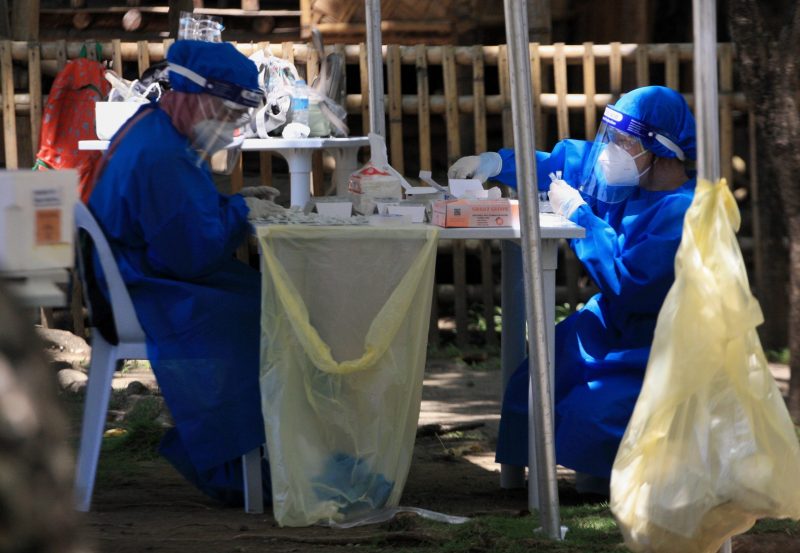DAVAO CITY (MindaNews / 16 July) – The city government is not inclined to relax some of the quarantine protocols just yet even after it was put under a General Community Quarantine (GCQ) with “heightened restrictions” from July 16 to 31.
 City Health Office personnel label the swab samples taken at Magsaysay Park, Davao City on Friday (June 4, 2021) from residents who had contacts with persons who tested positive of COVID-19. MindaNews photo by MANMAN DEJETO
City Health Office personnel label the swab samples taken at Magsaysay Park, Davao City on Friday (June 4, 2021) from residents who had contacts with persons who tested positive of COVID-19. MindaNews photo by MANMAN DEJETO
Dr. Michelle Schlosser, focal person for Davao City COVID-19 Task Force, told “Bika Bakunado” over Davao City Disaster Radio (DCDR 87.5) that current protocols to stem the spread of the virus in the city would remain.
She said COVID-19 infections in the city remained high, necessitating the stricter quarantine restrictions.
She said regulations would ease only if the transmission of COVID-19 is controlled in the coming days.
“We will stick to the old guidelines. We will continue to expand our contact tracing.
We will continue to follow executive orders until such time that we are able to bring down our cases and will eventually loosen up restrictions. As of the moment, it’s important that we implement heightened strategies to decrease our cases,” she said.
As of July 15, the Department of Health (DOH)-Davao reported a total of 27,862 COVID-19 cases, with 3,241 active ones, 23,665 recoveries, and 957 deaths in Davao City, considered the epicenter of the pandemic in Mindanao.
According to the Inter-Agency Task Force for the Management of Emerging Infectious Diseases, allowed in areas under GCQ with “heightened restrictions” are essential travel; indoor dine-in services at 20% venue or seating capacity or al fresco dining at 50% of the venue or seating capacity; outdoor tourist attractions may reopen at 30% with strict adherence to minimum public health standards;
Religious gatherings and gatherings for necrological services, wakes, inurnment and funerals for those who died of causes other than COVID-19 at 10% of the venue capacity; non-contact sports, games scrimmages held outdoors; personal care services not requiring mask removal such as salons, parlors beauty clinics at 30% capacity; and individuals aged 18 to 65 going out of their residences.
But entertainment venues (bars, concert halls, theaters, etc.), recreational venues (internet cafés, billiard halls, arcades, etc.), amusement parks, fairs, playgrounds, kiddie rides, indoor sports courts and venues and indoor tourist attractions, and venues for meetings, conferences and exhibitions will not be allowed in GCQ areas with “heightened restrictions”.
President Rodrigo Duterte has put the province of Davao Oriental under GCQ, and retained the provinces of Davao Occidental, Davao de Oro, Davao del Sur, and Davao del Norte under a Modified Enhanced Community Quarantine (MECQ) amid the surge of COVID-19 cases for the period July 16-31.
From April 4 to May 15, 2020, the city was placed under ECQ, under GCQ from May 16 until June 30, and modified GCQ from July 1 to November 19. It reverted to GCQ on November 20, 2020 until June 4, 2021.
Duterte added to the MECQ list last June 29 the rest of the provinces of the region for the period July 1 to 15.
Schlosser said the local government is not adopting IATF Resolution 124B, which sets the guidelines for fully vaccinated individuals.
Based on the resolution, the intrazonal movement of fully vaccinated senior citizens within areas under GCQ and Modified GCQ will continue to be allowed, subject to the presentation of a COVID-19 domestic vaccination card, or certificate of quarantine completion showing the holder’s vaccination status as may be issued by the Bureau of Quarantine.
It states that for fully vaccinated individuals who are close contacts of probable and confirmed COVID-19 cases, they may undergo a shortened seven-day quarantine period, provided they remain asymptomatic for the duration of the seven-day period with the first day being the date immediately after the last exposure.
In the event that a Reverse Transcription-Polymerase Chain Reaction (RT-PCR) test needs to be performed, it may be done not earlier than the fifth day after the date of the last exposure. For close contacts who may have been traced beyond the seventh day from last exposure and who have remained asymptomatic, no testing and quarantine shall be required.
Should the RT-PCR test yield a positive result, or he/she becomes symptomatic, he/she shall follow the prescribed testing and isolation protocols. The DOH and other relevant agencies are directed to amend their issuances accordingly.
The resolution also provides that for interzonal travel, the presentation of a COVID-19 domestic vaccination card, or certificate of quarantine completion showing the holder’s vaccination status as may be issued by the Bureau of Quarantine, shall be sufficient alternatives to any testing requirement before travel or upon arrival, which the local government unit of destination may require. (Antonio L. Colina IV/MindaNews)
